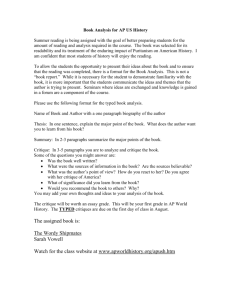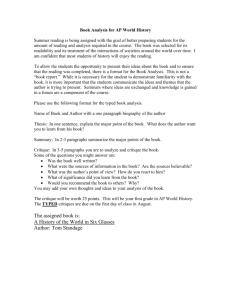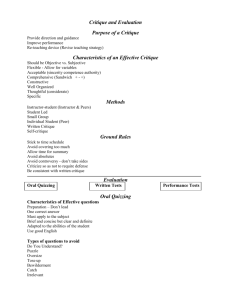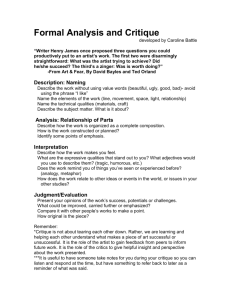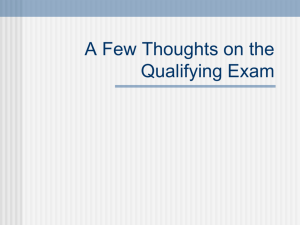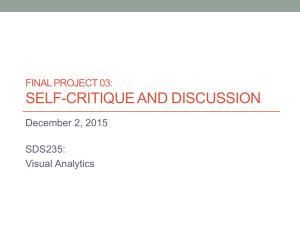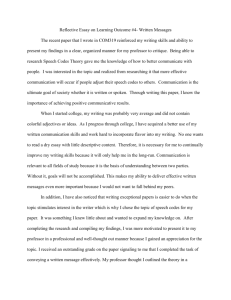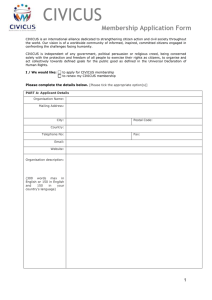Berkun, Scott (2005), The Art of Project Management, O'Reilly Media
advertisement
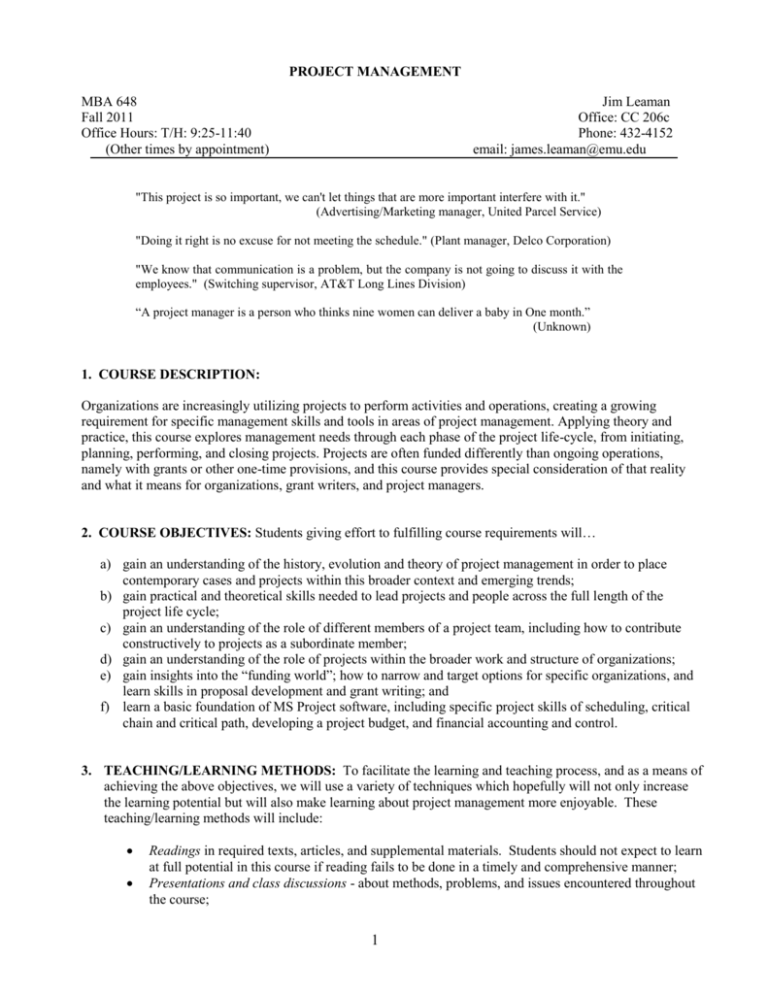
PROJECT MANAGEMENT MBA 648 Fall 2011 Office Hours: T/H: 9:25-11:40 (Other times by appointment) Jim Leaman Office: CC 206c Phone: 432-4152 email: james.leaman@emu.edu "This project is so important, we can't let things that are more important interfere with it." (Advertising/Marketing manager, United Parcel Service) "Doing it right is no excuse for not meeting the schedule." (Plant manager, Delco Corporation) "We know that communication is a problem, but the company is not going to discuss it with the employees." (Switching supervisor, AT&T Long Lines Division) “A project manager is a person who thinks nine women can deliver a baby in One month.” (Unknown) 1. COURSE DESCRIPTION: Organizations are increasingly utilizing projects to perform activities and operations, creating a growing requirement for specific management skills and tools in areas of project management. Applying theory and practice, this course explores management needs through each phase of the project life-cycle, from initiating, planning, performing, and closing projects. Projects are often funded differently than ongoing operations, namely with grants or other one-time provisions, and this course provides special consideration of that reality and what it means for organizations, grant writers, and project managers. 2. COURSE OBJECTIVES: Students giving effort to fulfilling course requirements will… a) gain an understanding of the history, evolution and theory of project management in order to place contemporary cases and projects within this broader context and emerging trends; b) gain practical and theoretical skills needed to lead projects and people across the full length of the project life cycle; c) gain an understanding of the role of different members of a project team, including how to contribute constructively to projects as a subordinate member; d) gain an understanding of the role of projects within the broader work and structure of organizations; e) gain insights into the “funding world”; how to narrow and target options for specific organizations, and learn skills in proposal development and grant writing; and f) learn a basic foundation of MS Project software, including specific project skills of scheduling, critical chain and critical path, developing a project budget, and financial accounting and control. 3. TEACHING/LEARNING METHODS: To facilitate the learning and teaching process, and as a means of achieving the above objectives, we will use a variety of techniques which hopefully will not only increase the learning potential but will also make learning about project management more enjoyable. These teaching/learning methods will include: Readings in required texts, articles, and supplemental materials. Students should not expect to learn at full potential in this course if reading fails to be done in a timely and comprehensive manner; Presentations and class discussions - about methods, problems, and issues encountered throughout the course; 1 Completion of various problem solving exercises throughout the term; Analyzing and discussing case studies and proposing possible solutions to problems; Use of outside speakers, videos and/or other multimedia methods; Two-way evaluations: examinations and written projects for students and formal and informal evaluation of the instructor (clarity of presentation, use of examples, pace, etc.). Feedback from these evaluations will be used to modify the course in progress and in the future. 4. COURSE REQUIREMENTS AND EVALUATION: Specific course requirements and grading weights are as follows: Project........................................................................................................................ 50% Case Study ................................................................................................................. 20% Book Critique ............................................................................................................ 20% Class Participation ..................................................................................................... 10% Grading scale: Below 70% F 93% -100% A 90% - 92% A- 87% - 89% B+ 83% - 86% B 80% - 82% B- 77% - 79% C+ 73% - 76% C 70% - 72% C- Project: The culminating assignment for this course will be a paper/project of significant scope and designed to bridge theory, skills and practice. Students will first identify a Request for Proposal (RFP), then respond by designing and presenting a full project proposal. The documentation of this project will be due on the date of the final class session, and the proposal will be presented to the class. More specific details will be provided early in the course. Book Critique: The instructed course is intended as a survey of the broad coverage of the topics of project management and grant writing. The book critique project provides the opportunity for students to delve more deeply into one of the component areas of either of these topics through reading and critiquing any one book of their choosing from the list of recommended texts (below) or from an approved book proposed to the instructor. More specific details will be provided early in the course. Case Study: Students will identify a project with which they have had personal experience. This case will be analyzed, written, and presented to the class. Selecting a case with problems and/or controversies will make this project more meaningful and interesting. More specific details will be provided early in the course. Class Participation: Your active participation in class discussions is considered a very important part of the learning experience and will contribute to broader perspectives and a more rich and interesting learning environment for all. Voluntary oral contributions in class are a notable component of class participation; in addition, the following lists are illustrative examples of behaviors that add to, or detract from, the overall class participation grade, and your learning in the course: Activities/behaviors that add value: - attend class, arriving on time - demonstrate preparedness for class - be actively engaged in the learning - take notes in class when appropriate - engage in oral discussion in class ** Activities/behaviors that detract value: - being absent from class, or arriving late - demonstrate lack of preparedness for class - being disengaged/distanced from the learning - texting or other use of personal electronics - sleeping in class or other distracting conduct On-Time Work: Late papers may be accepted but with one letter grade deducted for each calendar day late. Work submitted after the completion of the semester will be deducted at least one letter grade, depending on length of late submission. 2 5. ATTENDANCE POLICY AND ADMINISTRATIVE ISSUES: Attendance: Due to the once-per-week format, each class session carries significant weight; therefore, absences will be noticed and noted, and remember that 10% of the overall semester grade is for class participation, which cannot be earned in absentia. In addition, I make the assumption that you enrolled in this class because you want to learn something about the subject matter; so I have high expectation for student attendance. Communication: EMU’s online Moodle system will be used to facilitate communication in this course. Students are responsible to check Moodle for announcements, messages and related information. The “Discussion Board” tool on Moodle may be used to post articles or ideas for discussion (out-of-class), or to respond to articles or reflections posted by classmates or the instructor. Writing: Being able to write well is an important skill to develop. To facilitate strong writing skills, and consistent with EMU’s “writing across the curriculum” policy, all writing assignments will be evaluated using the “writing standards – Graduate Level (Grid Version)” form that is posted on Moodle under Course Information. Before handing in a writing assignment, students are encouraged to evaluate their own writing using the grid. Be sure to avoid any form of plagiarism in your writing. If you have doubts about what is appropriate, a useful website is http://www.indiana.edu/~istd/. In addition, please review the EMU Graduate Catalog for university policy. Please take advantage of the free individual tutoring from EMU’s writing tutors. Writing tutors are strong writers who hold scheduled one-on-one sessions with students and are an excellent resource for writers at any level or at any stage in the writing process. Please remember that writing tutors do not provide an editing or proofreading service. They will help you put what you learn into practice and will work with you to improve your own proofreading and editing skills. To make an appointment, please visit the Academic Support Center on the 3rd floor of the Hartzler Library. Special Needs: If you have received services in the past related to a learning disability or attention deficit disorder and/or feel you may have difficulties in this course, please make an appointment to speak with me during my office hours or with the Coordinator of Student Disability Support Services in the Academic Support Center on the 3rd floor of the Hartzler Library. 6. RESOURCES: (required texts) Kloppenborg, Timothy J. (2009), Contemporary Project Management, South-Western Cengage Learning: Mason, OH. Karsh, Ellen & Arlen Sue Fox (2006), The Only Grant-Writing Book You’ll Ever Need, Basic Books: New York. 7. ACADEMIC INTEGRITY: Academic integrity and appropriate classroom behavior is assumed. Any student found violating these standards may receive an “F” for the course. A second violation may result in dismissal from the program. See EMU catalogue and handbook for more details. Plagiarism (the use of ideas and words taken from another source without citation) is a serious offense. In addition, knowingly helping or allowing someone else to cheat is academic dishonesty. 3 8. TENTATIVE SCHEDULE: (based on projection of seven students) Suggestions for modifying the schedule, methods and requirements are welcome so long as they increase the learning potential. Because of this, and because I believe that we learn as we go along, it is quite possible that there may be changes in the course, especially the schedule, over the semester. DATE Sep 1 Sep 8 Sep 15 Sept 22 Sept 29 Oct 6 Oct 13 Oct 20 Oct 27 Nov 3 Nov 10 Nov 17 Nov 24 Dec 1 Dec 8 Dec 15 RESOURCES & ASSIGNMENTS TOPIC Part I: Introduction, Organizing and Initiating Syllabus & Assignments Introduction to course Kloppenborg chapter 1 Introduction to Project Management Kloppenborg chapter 2 Project selection and prioritization K&F Part I (pp. 1-43) GW Prerequisites: Lessons 1 and 2 Kloppenborg chapters 3 and 4 Organizational capability & Chartering K&F Part I (pp. 44-99) GW Prerequisites: Lessons 3, 4, FR1 Part II: Planning and Writing Kloppenborg chapter 5 Stakeholder analysis & communication K&F Part II (pp. 101-144) GW Writing: Lessons 5-7 Kloppenborg chapter 6 Scope and work breakdown structures K&F Part II (pp. 145-185) GW Writing: Lessons 8-10 Kloppenborg chapter 7 Scheduling projects K&F Part II (pp. 186-225) GW Writing: Lessons 11-14 Kloppenborg chapter 8 **GUEST** Resourcing projects K&F Part II (pp. 226-274) GW Writing: Lessons 15, 16, FR2 Kloppenborg chapter 9 Budgeting Projects K&F Part III+ (pp. 275-311) GW Implementation: Lessons 17, 18, FR3 Kloppenborg chapter 10 Project risk planning Application & area focus (A&AF) One case and one book critique Kloppenborg chapter 11 **TENTATIVE** Project quality planning and kickoff A&AF One case and one book critique Part III: Performing and Evaluating Kloppenborg chapter 12 Supply chain management A&AF One case and one book critique Kloppenborg chapter 13 Leading & managing project teams A&AF One case and one book critique No Class – Thanksgiving Kloppenborg chapter 14 Project progress and results A&AF One case and one book critique Kloppenborg chapter 15 Finishing the project A&AF One case and one book critique TBA Project presentations Course evaluation ** I’m trying to arrange a Saturday field experience to a) provide more practical/local application of our learning and b) fulfill required seat time hours for the class. 4 8. BIBLIOGRAPHY Berkun, Scott (2005), The Art of Project Management, O’Reilly Media: Cambridge, MA. Berkun, Scott (2008), Making Things Happen: Mastering Project Management, O’Reilly Media: Camb., MA. Brown, James T. (2008), The handbook of program management [electronic resource] : how to facilitate project success with optimal program management, McGraw-Hill, E-book from Ebsco. Crowe, Andy (2006), Alpha Project Managers: What the Top 2% Know that Everyone Else Does Not, Velociteach: Kennesaw, GA. Cunningham, Michael C. (2006), Finish What you Start: 10 Surefire Ways to Deliver your Projects On Time and On Budget, Kaplan Business: New York. Dvir, Dov & Aaron J. Shenhar (2007), Reinventing Project Management: The Diamond Approach to Successful Growth and Innovation, Harvard Business: Cambridge, MA. Kendrick, Tom (2004), The Project Management Toolkit: 100 Tips and Techniques for Getting the Job Done Right, AMACOM Books: Boston, MA. Kendrick, Tom (2006), Results Without Authority: Controlling a Project When the Team Doesn’t Report to You, AMACOM Books: Boston, MA. Kendrick, Tom (2009), Identifying and managing project risk [electronic resource] : essential tools for failureproofing your project, AMACON, E-book From Ebsco. Kerzner, Harold (2009), Project Management Case Studies, 3rd ed., Wiley: New York. Lambeck, Richard (2009), Urban construction project management [electronic resource], McGraw-Hill, Ebook from Ebsco. Leach, Lawrence P. (2005), Lean Project Management: Eight Principles for Success, Advanced-Projects: Boise, Idaho. Lewis, James (1998), Team-Based Project Management, Beard Books. Lewis, James (2008), Mastering project management [electronic resource] : applying advanced concepts to systems thinking, control & evaluation, resource allocation, McGraw-Hill, E-book from Ebsco. Martin, Paula & Karen Tate (1997), The Project Management Memory Jogger: A Pocket Guide for Project Teams, Goal/QPC: Salem, NH. McNamara, Carter (2006), Field Guide to Nonprofit Program Design, Marketing and Evaluation, 4th ed., Authenticity Consulting, LLC: Toronto. Mersino, Anthony C. (2007), Emotional intelligence for project managers [electronic resource] : the people skills you need to achieve outstanding results, American Management Association, E-book by Ebsco. 5 Morris, Rick A. & Brette M. Sember (2008), Project Management that Works: Real-World Advice on Communicating, Problem-Solving, and Everything Else you Need to Know to Get the Job Done, AMACOM Books: Boston, MA. Pacelli, Lonnie (2004), The Project Management Advisor: 18 Major Project Screw-Ups, and how to Cut them off at the Pass, Prentice Hall: New York. Rose, Kenneth H. (2005), Project Quality Management: Why, What and How, J. Ross Publishing: Ft. Lauderdale, FL. Russell, Lou (2007), 10 Steps to Successful Project Management, ASTD Press: Alexandria, VA. Snead, G. Lynne (2002), The Project Management Scorecard: Measuring the Success of Project Management Solutions, Butterworth-Heinemann: Oxford. Shenhar, Aaron (2007), Reinventing project management : the diamond approach to successful growth and innovation, Harvard Business School Press, Cambridge. Shim, Jae K. (2010), Project Management: A Financial Perspective, Global Professional. Tate, Karen (2001), Getting Started in Project Management, Wiley: New York. Turner, J. Rodney (2009), The handbook of project-based management [electronic resource] : leading strategic change in organizations, McGraw-Hill, E-book from Ebsco. Wiefling, Kimberly (2007), Scrappy Project Management: The 12 Predictable and Avoidable Pitfalls Every Project Faces, Scrappy About: Cupertino, CA. Wong, Zachary (2007), Human Factors in Project Management: Concepts, Tools, and Techniques for Inspiring Teamwork and Motivation, Jossey-Bass: San Francisco. Additional resources for expanded study, though not for Book Critique: Church, Cheyanne & Rogers, Mark M. (2006), Designing for Results: Integrating Monitoring and Evaluation in Conflict Transformation Programs, Search for Common Ground. http://www.sfcg.org/programmes/ilr/ilt_manualpage.html Thomas, Lainie, (2005), Capacity Building for local NGOs: A guidance manual for good practice, Catholic Insitute for International Relations, http://www.ciir.org/Templates/Internal.asp?nodeid=91674&int1stParentNodeID=89630&int2ndParentN odeID=90417 http://www.civicus.org/toolkits In particular the following: Shapiro, Janet, Writing a Funding Proposal Toolkit, CIVICUS http://www.civicus.org/new/media/Writing%20a%20funding%20proposal.pdf Shapiro, Janet, Budgeting Toolkit, CIVICUS http://www.civicus.org/new/media/Budgeting.pdf and http://www.civicus.org/new/media/Budgeting%20BEST%20PRACTICE.pdf 6 Shapiro, Janet, Overview of Planning Toolkit, CIVICUS http://www.civicus.org/new/media/Overview%20of%20Planning.pdf Shapiro, Janet, Monitoring and Evaluation Toolkit, CIVICUS http://www.civicus.org/new/media/Monitoring%20and%20Evaluation.pdf Shapiro, Janet, Financial Control and Accountability Toolkit, CIVICUS http://www.civicus.org/new/media/Financial%20Control%20and%20Accountability.pdf Jackson, Terence (2003), Cross-cultural Management and NGO Capacity Building: Why a cross-cultrual Approach is Necessary, INTRAC: Oxford. http://www.intrac.org/pages/PraxisNote1.html Malunga, Chiku with Rick James (2004), Using African Proverbs in Organizational Capacity Building, INTRAC: Oxford. http://www.intrac.org/pages/PraxisNote6.html Mango (2003), Mango’s Financial Management Health Check: How healthy is the financial management in your NGO? Pilot Version, http://www.mango.org.uk/guide/files/mango-health-check-in-english-jul05.doc Mango (2005), Twenty Questions to ask when Reviewing Financial Information http://www.mango.org.uk/guide/resources/otherresources.aspx Mango (2005), A Manager’s Financial Management Checklist http://www.mango.org.uk/guide/files/managers-checklist.doc 7

